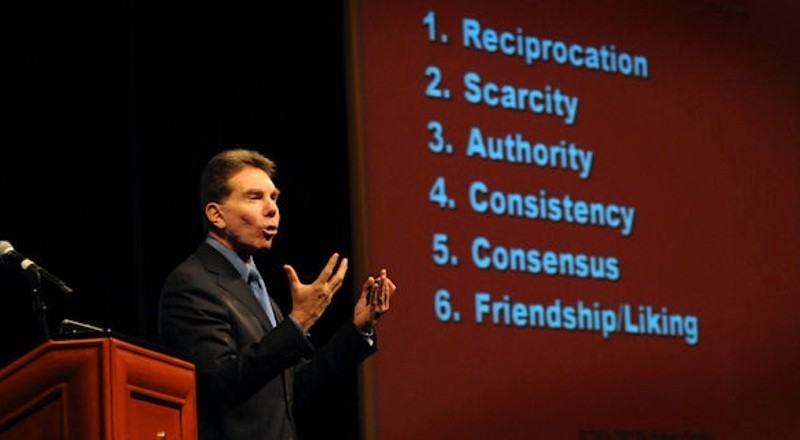Robert Cialdini is world-renowned by his book “Influence: The Psychology of Persuasion” (1984), a work that has become a must-have for businessmen, advertisers and marketers. In this book, Cialdini exposes his 6 principles of persuasion or influence.
1. The Principe of Reciprocity
According to this principle, human relations tend to be reciprocal. People tend to treat others in the same way they are being treated. If an individual is treated with respect and cordiality, he will respond in the same way. Also, if he receives a gift or benefit, he will feel the need to correspond it. This principle also works to bring closeness: if we tell someone something secret or intimate, that person will be more likely to tell us something similar.
2. The Principle of Scarcity
The scarcity principle states that we are more interested in acquiring things if we think they are unique or difficult to get. This is why we value limited editions of artworks or the opportunity to meet a very important and sought after person. Advertisers use this principle when they create “limited time only” or “while stocks last” offers. “Invitation only” services are another example.
3. The Principle of Authority
We are more predisposed to being influenced when we are addressed by an authority. This principle is not related to the exercise of power or coercion, but with the credibility aura and the status that authorities have. We tend to think that those who are in a high hierarchy have more knowledge, experience or more right to give an opinion. The principle of authority applies when public figures influence public opinion. Sometimes, to make an idea or product be accepted by a massive audience, we only have to convince a small group of experts in the area. Celebrities are big influencers when they talk about political ideas or products, even if they are not experts on the topics they talk about.

4. The Principle of Commitment and Consistency
According to this principle, people will be much more likely to accept something if the offer is in line with assumptions or statements that themselves have made before in front of the person who is making the offer. This happens because we are always trying to show a coherent behaviour, even when our previous actions have not been thought out carefully. This explains why getting a new customer is more difficult than keeping an old one. If we want someone to take an impulsive and spontaneous decision, we should first make them define themselves as adventurous and impulsive.
5. The Principle of Social Proof
The social proof principle, also called consensus principle, states that we tend to adapt our ideas to the majority opinion. We are more likely to accept something if others have already accepted it, and we are more likely to reject it if others have rejected it. For example, reviews from previous customers have a great influence on the decision to purchase. Likewise, when we see that a brand or person has many followers on social networks, we are more likely to follow them too.
6. The Principle of Liking
This is a very simple principle: we are more likely to be influenced by people we like. According to the “halo effect”, when someone or something has positive qualities, we tend to presume that they are also good in any other aspect. For example, an attractive person could be assumed to be honest, intelligent and successful. It could also happen by closeness and familiarity: if you have something in common with another person, you could assume that that person is like you and be more open to his influence.

